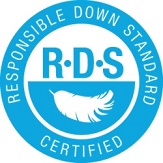 SALT LAKE CITY—Textile Exchange (TE) announced the addition of Adidas, Black Diamond, Kathmandu (NZ), NAU, and Timberland to a growing roster of global brands committed to its Responsible Down Standard (RDS). On January 19 the organization also celebrated the release of RDS v2 for public comment.
SALT LAKE CITY—Textile Exchange (TE) announced the addition of Adidas, Black Diamond, Kathmandu (NZ), NAU, and Timberland to a growing roster of global brands committed to its Responsible Down Standard (RDS). On January 19 the organization also celebrated the release of RDS v2 for public comment.
Officially launched in January 2014, the RDS is the most comprehensive, global, third-party certified animal welfare and traceability standard for down and feathers available for use by any company. The RDS, released in January 2014 with the first certificate issued in June 2014, is now working with more than 350 farms, raising more than 100 million birds.
“The many brands and companies that have signed on to RDS deserve credit for their commitment,” said Anne Gillespie, Director of Industry Integrity, Textile Exchange. “I’m proud of the scale that we have achieved with the RDS, and the incredible energy that our International Working Group has put into the revision. We anticipate further strong growth, particularly as we move into the home and bedding markets. Our goal is to protect the welfare of as many ducks and geese as possible.”
Adidas, Black Diamond, Kathmandu (NZ), NAU and Timberland join an already strong list of global brands committed to bringing certified, responsible down to market including The North Face, Eddie Bauer, Marmot, Mammut, Helly Hansen, Outdoor Research, DownLinens, Down & Feather Co. and H&M.
An Open Revision Process
Since becoming the owner of the RDS, Textile Exchange has driven an open revision process to bring in broad stakeholder input. Working closely with brands, suppliers, industry organizations, and animal welfare groups such as Humane Society International, RDS v2 was released for public comment on January 19. In particular the animal welfare group Four Paws has been a strong and positive contributor to the development of the standard, ensuring that the RDS addresses the full spectrum of interests. The revised standard includes an optional Parent Farm module for companies looking to go beyond the direct sources of their down, has eliminated any parallel production of certified and non-certified waterfowl at the farm level, further strengthens the animal welfare criteria and auditing requirements and increases the strictness of product labeling by only allowing labeling of 100 percent RDS products.
Down and feathers are sourced from waterfowl already earmarked for food supply. There is an inevitable risk of animal welfare issues with the use of farm animals for industrial purposes. Down goes through multiple sorting, separation and cleaning processes to get to the final high-quality material used in RDS certified products. The primary mandate of the RDS is to prevent practices such as force-feeding and live-plucking as well as provide strict requirements on issues such as food and water quality, housing, stock density and outdoor access, animal health, hygiene and pest and predator control, among others, all supported with traceability through to the final product.
“The first year of the RDS was a tremendous success and we are proud to have contributed to the improvement of the lives of so many animals in the down supply chain,” said Adam Mott, Director of Sustainability, The North Face. “We are excited to see such rapid adoption of the standard through the commitment of brands and suppliers inside and outside of our industry. The update of the RDS will strengthen an already effective, successful standard and we commend Textile Exchange for their tireless work in leading the way.”
Click here for more information.






